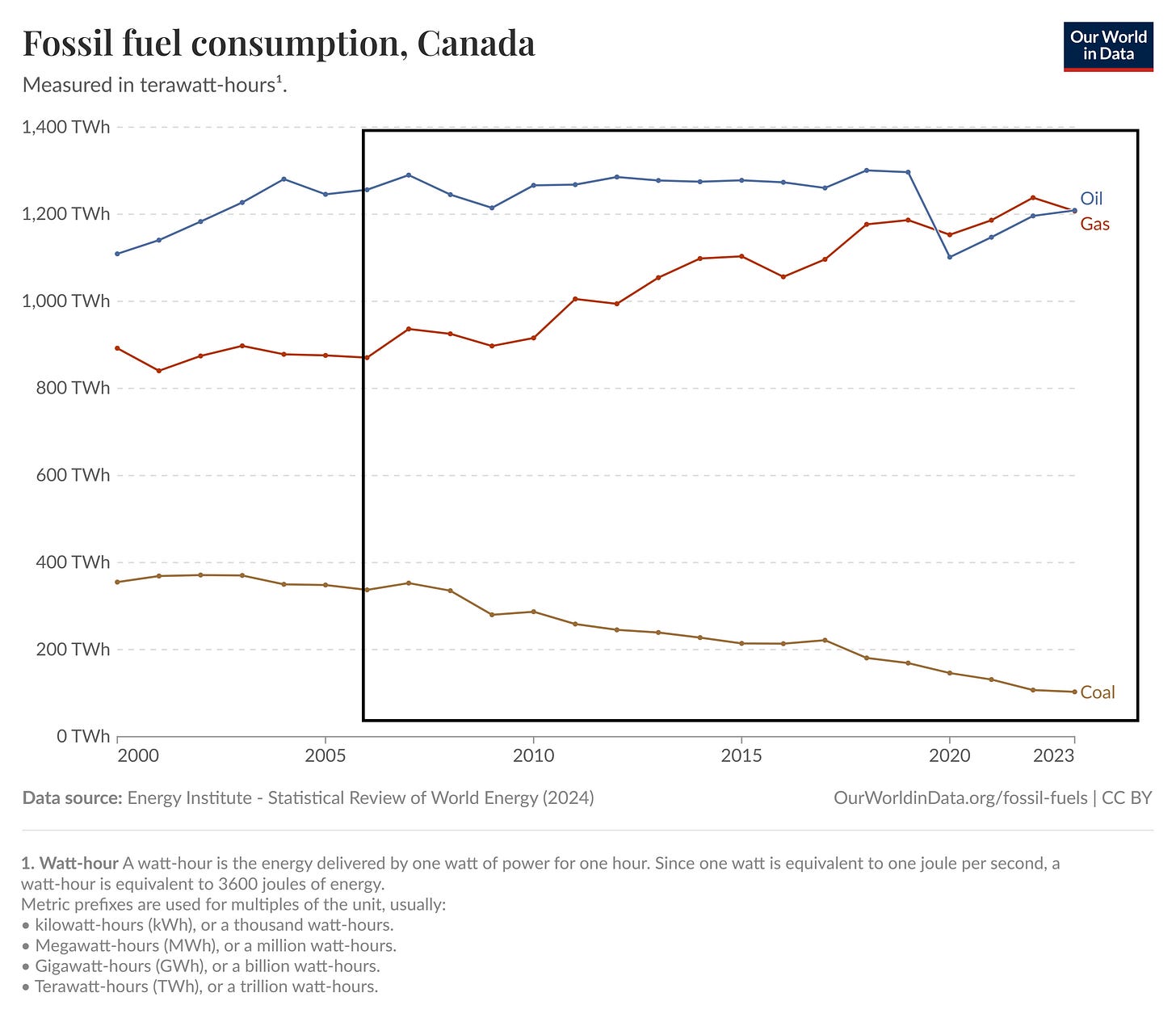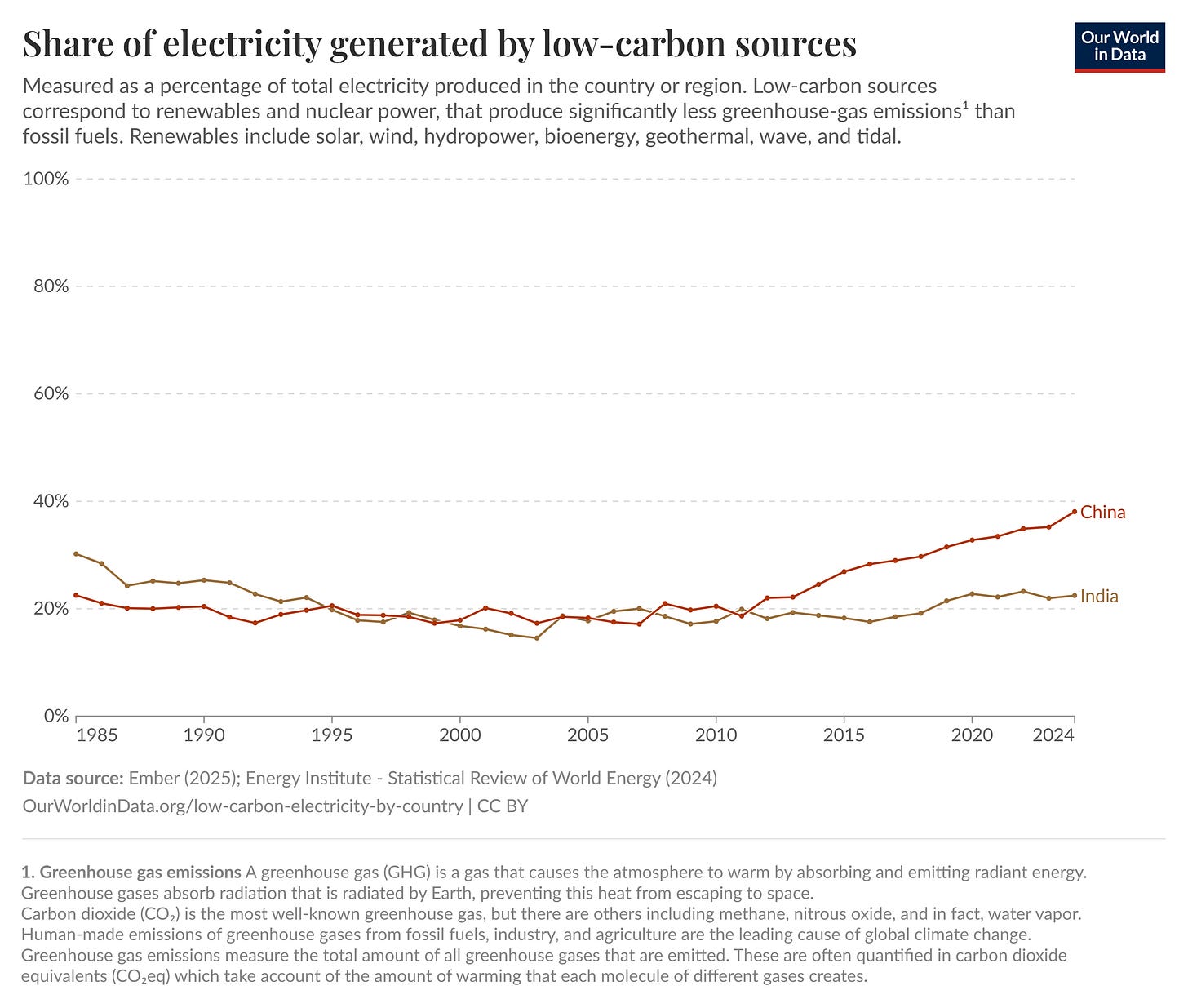𝗜𝘀 𝗻𝗮𝘁𝘂𝗿𝗮𝗹 𝗴𝗮𝘀 𝗮 “𝗖𝗹𝗲𝗮𝗻 𝗙𝘂𝗲𝗹”?
Many have pointed out the role that natural gas can play as a low carbon fuel and as a bridge to a lower carbon future. And during my Clean Fuels panel at EVOLVE, my guests presented 𝗴𝗮𝘀 𝗮𝘀 𝗽𝗮𝗿𝘁 𝗼𝗳 “𝗰𝗹𝗲𝗮𝗻 𝗳𝘂𝗲𝗹𝘀” 𝗽𝗼𝗿𝘁𝗳𝗼𝗹𝗶𝗼𝘀.
𝘽𝙪𝙩 𝙞𝙨 𝙜𝙖𝙨 𝙧𝙚𝙖𝙡𝙡𝙮 𝙖 “𝙘𝙡𝙚𝙖𝙣 𝙛𝙪𝙚𝙡”?
This, of course, is a matter of perspective. 𝗥𝗲𝗹𝗮𝘁𝗶𝘃𝗲 𝘁𝗼 𝗰𝗼𝗮𝗹, 𝗴𝗮𝘀 𝗶𝘀 𝗰𝗲𝗿𝘁𝗮𝗶𝗻𝗹𝘆 𝗶𝘀. 𝗔𝗹𝗺𝗼𝘀𝘁 𝟲𝟬% 𝗹𝗼𝘄𝗲𝗿 𝗼𝗻 𝗮 𝗖𝗢𝟮 𝗽𝗲𝗿 𝗸𝗪𝗵 𝗯𝗮𝘀𝗶𝘀, according to EIA data (2.31 vs 0.96 lbs/kWh). However, methane releases along the production and transportation networks eat into this advantage.
However, relative to zero carbon power sources like solar, wind and nuclear, gas remains a CO2 intensive fuel.
And that 𝗿𝗲𝗹𝗮𝘁𝗶𝘃𝗶𝘁𝘆 𝗺𝗮𝘁𝘁𝗲𝗿𝘀. Countries like 𝗖𝗮𝗻𝗮𝗱𝗮 𝗮𝗻𝗱 𝘁𝗵𝗲 𝗨𝗦, 𝗲𝗻𝗱𝗼𝘄𝗲𝗱 𝘄𝗶𝘁𝗵 𝗽𝗹𝗲𝗻𝘁𝗶𝗳𝘂𝗹 𝗹𝗼𝘄 𝗰𝗼𝘀𝘁 𝗴𝗮𝘀 (𝘁𝗵𝗮𝗻𝗸𝘀 𝘁𝗼 𝘀𝗵𝗮𝗹𝗲) 𝗵𝗮𝘃𝗲 𝗿𝗮𝗽𝗶𝗱𝗹𝘆 𝗮𝗱𝗼𝗽𝘁𝗲𝗱 𝘁𝗵𝗲 𝗳𝘂𝗲𝗹 𝗮𝘀 𝗮 𝗿𝗲𝗽𝗹𝗮𝗰𝗲𝗺𝗲𝗻𝘁 𝘁𝗼 𝗰𝗼𝗮𝗹 𝗮𝗻𝗱 𝗶𝗻 𝘁𝗵𝗶𝘀 𝘀𝗲𝗻𝘀𝗲 𝘁𝗵𝗲 𝗳𝘂𝗲𝗹 𝗶𝘀 𝗹𝗶𝘃𝗶𝗻𝗴 𝘂𝗽 𝘁𝗼 𝘁𝗵𝗲 "𝗰𝗹𝗲𝗮𝗻" 𝗹𝗮𝗯𝗲𝗹.
Even in countries where gas is expensive, like South Korea, this substitution is visible.
China and India are often highlighted for their coal buildout. Today, gas is a minor player in their energy mix and 𝘁𝗵𝗲 𝘄𝗼𝗿𝗹𝗱, 𝗳𝗿𝗼𝗺 𝗮𝗻 𝗲𝗺𝗶𝘀𝘀𝗶𝗼𝗻𝘀 𝘀𝘁𝗮𝗻𝗱𝗽𝗼𝗶𝗻𝘁, 𝗺𝗶𝗴𝗵𝘁 𝗽𝗿𝗲𝗳𝗲𝗿 𝘁𝗵𝗲 𝗰𝗼𝗮𝗹 𝘄𝗲𝗱𝗴𝗲 𝘄𝗮𝘀 𝘀𝘄𝗮𝗽𝗽𝗲𝗱 𝗳𝗼𝗿 𝗴𝗮𝘀.
These countries find themselves adopting other low carbon technologies (nuclear and renewables), rather than gas, alongside coal. And they are doing so at a sufficient rate that low carbon sources are taking a growing share of their electricity mix.
𝙎𝙤 𝙬𝙝𝙖𝙩 𝙞𝙨 𝙖 “𝙘𝙡𝙚𝙖𝙣 𝙛𝙪𝙚𝙡”? 𝙏𝙝𝙚 𝙖𝙣𝙨𝙬𝙚𝙧, 𝙞𝙨 𝙨𝙚𝙚𝙢𝙨, 𝙙𝙚𝙥𝙚𝙣𝙙𝙨 𝙤𝙣 𝙬𝙝𝙖𝙩 𝙩𝙝𝙚 𝙖𝙡𝙩𝙚𝙧𝙣𝙖𝙩𝙞𝙫𝙚 𝙞𝙨.








Good call out. O&G fugitive emissions get plenty of attention. Coal seems to fly under the radar.
"𝗥𝗲𝗹𝗮𝘁𝗶𝘃𝗲 𝘁𝗼 𝗰𝗼𝗮𝗹, 𝗴𝗮𝘀 𝗶𝘀 𝗰𝗲𝗿𝘁𝗮𝗶𝗻𝗹𝘆 𝗶𝘀 [cleaner]. 𝗔𝗹𝗺𝗼𝘀𝘁 𝟲𝟬% 𝗹𝗼𝘄𝗲𝗿 𝗼𝗻 𝗮 𝗖𝗢𝟮 𝗽𝗲𝗿 𝗸𝗪𝗵 𝗯𝗮𝘀𝗶𝘀, according to EIA data (2.31 vs 0.96 lbs/kWh). However, methane releases along the production and transportation networks eat into this advantage." It's true about the methane releases ("fugitive emissions") eating into the advantage of gas over coal. However one of the largest sources of methane release is coal mining itself. Once fugitive emissions from coal mining is accounted for, the advantage of gas (mostly methane) looks better. Also 'upstream' methane leaks in the gas production and distribution process have more straightforward engineering solutions than leaks from coal mines themselves, especially open-cut mines. There are a number of solutions to methane leaks from coal mines as well and many of these are being implemented.